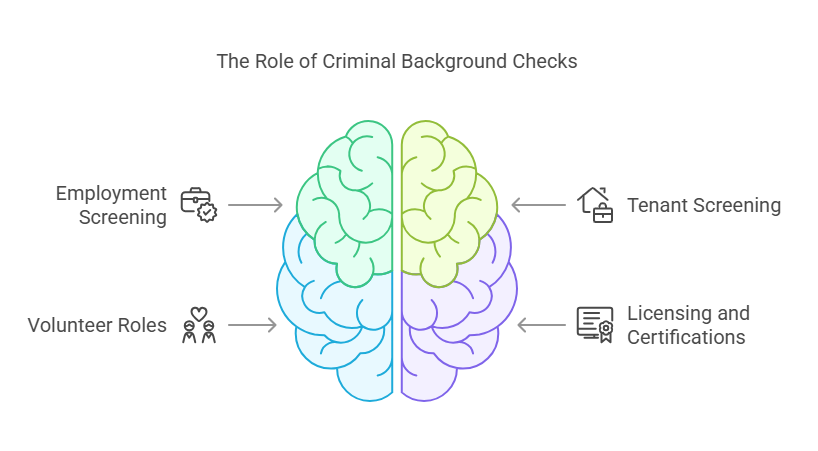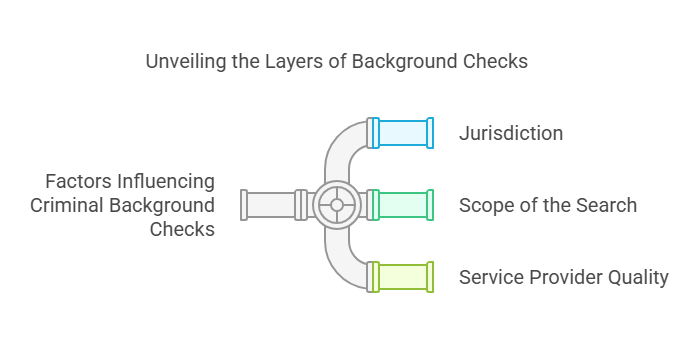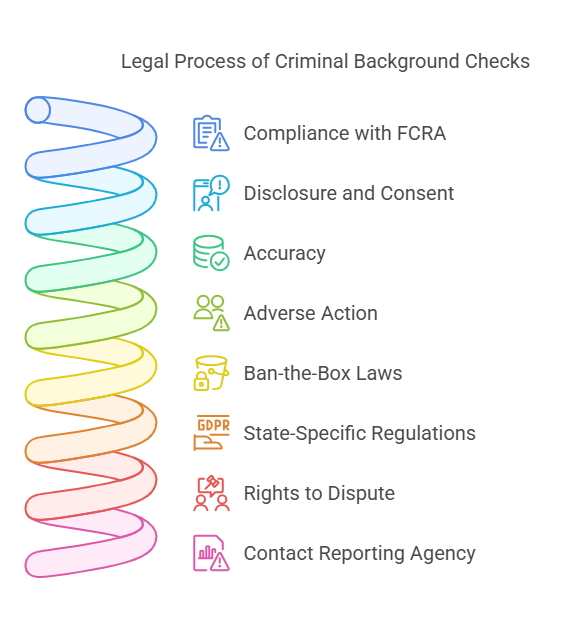Understanding the Impact of Criminal Background

Understanding Criminal Background Checks
A criminal background check is a process used to review an individual’s criminal history and to verify whether they have any prior criminal offenses. This check is often a critical step in various professional and personal situations where security and trust are essential, such as employment, housing, and licensing.
What Is a Criminal Background?
A criminal background refers to an individual’s history related to crimes they may have committed. It includes:
- Arrest records: Documents related to when a person has been apprehended by law enforcement.
- Convictions: Legal findings of guilt, including felonies and misdemeanors.
- Pending charges: Charges for crimes that are still under investigation or awaiting trial.
- Sex offender registry: A list of individuals convicted of sex crimes who are required to register with authorities.
What Does a Criminal Background Check Entail?
A criminal background check involves gathering and reviewing various types of records that detail an individual’s criminal history. The process typically involves:
- Local and national criminal databases: Accessing various databases to check an individual’s criminal history within local jurisdictions, as well as nationwide.
- Court records: Reviewing information from court records, including any convictions, pending charges, and the outcome of legal proceedings.
- Sex offender registry: Verifying whether an individual is listed on the national sex offender registry.
Criminal background checks vary in terms of the records included, the depth of the search, and the jurisdictions covered. For example, an employer might request a background check that only focuses on the last five years, while a landlord may look for any criminal history over the applicant’s lifetime.
The Importance of Criminal Background Checks

Criminal background checks play an important role in ensuring safety and trust across various scenarios. They are essential in the following contexts:
1. Employment Screening
Employers use criminal background checks to ensure that potential employees do not have a history that would pose a risk in the workplace. Criminal history may indicate violent tendencies, dishonesty, or violations of trust—issues that could jeopardize company security and culture.
2. Tenant Screening
Landlords often perform criminal background checks on prospective tenants to ensure that they are renting to individuals with a clean record, minimizing risks such as property damage, theft, or disturbances caused by criminal behavior.
3. Volunteer Roles
Organizations and institutions that rely on volunteers, such as schools, healthcare providers, and nonprofits, often perform criminal background checks to safeguard their clients, staff, and other volunteers, ensuring that no one with a history of criminal behavior is placed in vulnerable situations.
4. Licensing and Certifications
Certain professions require a background check to obtain or maintain professional licenses. For example, doctors, teachers, lawyers, and financial advisors must undergo background checks to ensure their eligibility for these critical roles.
Types of Records Included in a Criminal Background Check
Criminal background checks gather a variety of records depending on the nature and scope of the request. The key records reviewed include:
1. Arrest Records
Arrest records show when an individual has been detained by law enforcement. However, it’s important to note that an arrest alone doesn’t imply guilt. Arrest records may or may not appear in background checks, depending on whether the charges were formally filed or the case was dismissed.
2. Convictions
Convictions refer to instances where a court finds someone guilty of a criminal offense. Convictions can be classified into:
- Felonies: Serious crimes, such as murder, assault, and large-scale theft.
- Misdemeanors: Less serious offenses, such as petty theft or simple assault.
Felonies are typically more significant and may have long-lasting effects on a person’s criminal record. Misdemeanors, while still serious, may have less impact on employment or housing opportunities.
3. Pending Charges
Pending charges are accusations that have not yet been adjudicated in court. Some background checks may reveal pending charges, while others may focus solely on finalized convictions.
4. Sex Offender Registry
The sex offender registry includes individuals convicted of sex-related crimes who must register with authorities. These records are typically public and are frequently included in background checks, particularly for roles that involve working with vulnerable populations.
Timeframes and Criminal Records
The time period covered by a criminal background check can impact the results. For example, some background checks only cover records from the last five years, while others may look back further, even including the entire history of an individual. The relevance of older convictions may vary depending on the specific purpose of the check.
Key factors include:
- Recent convictions are more likely to be relevant to employers or landlords than older offenses.
- State and federal guidelines determine how far back certain types of criminal history can be accessed for employment or housing decisions.
Steps Involved in Conducting a Criminal Background Check
1. Obtaining Consent
Before conducting a criminal background check, the individual must provide consent. This is a legal requirement in many jurisdictions, especially for employment and housing checks. The consent ensures that the individual is aware their criminal history is being reviewed.
2. Accessing Public Records
Public records are typically accessed via government databases. For example, court records, arrest histories, and sex offender registries are publicly available in many jurisdictions. However, the accessibility and format of these records vary by state, which can impact the cost and ease of conducting a background check.
3. Verification
For comprehensive criminal background checks, providers may contact courts or law enforcement agencies directly to verify the accuracy of the records. Third-party agencies often provide this verification service for employers and landlords to ensure reliable results.
4. Reporting the Results
Once the data is collected and verified, the results are compiled into a report, often segmented by the type of record found (e.g., convictions, pending charges). The report is then provided to the requesting party, such as an employer, landlord, or licensing agency.
Factors Influencing the Outcome and Depth of a Criminal Background Check

Several factors can impact how comprehensive and detailed a criminal background check is:
1. Jurisdiction (State vs. Federal Checks)
The jurisdiction being searched is a crucial factor. State-level checks typically search records within a single state, while federal checks can access records across the entire country. Some checks may also search international databases, depending on the scope of the request.
2. Scope of the Search (Local, National, or International)
- Local searches generally focus on county or city-level records and are often the most basic and cost-effective.
- National checks cover a wider range of data, including records from all 50 states.
- International checks are used when individuals have lived abroad or are applying for jobs overseas.
3. Service Provider Quality
Different background check services vary in terms of the comprehensiveness and speed of their searches. Professional services typically provide more thorough, accurate, and reliable checks compared to DIY approaches. These services also handle legal compliance issues, ensuring that reports are generated in accordance with applicable laws.
Advantages of Professional Background Check Services
| Factor | Professional Services | DIY Approach |
|---|---|---|
| Speed | Fast processing with quick turnaround | May take longer to gather all necessary records |
| Accuracy | Verified and reliable results | May miss important details or contain errors |
| Legal Compliance | Ensures compliance with laws (e.g., FCRA, Ban-the-box) | May inadvertently violate legal requirements |
| Scope of Search | Comprehensive, including national and international checks | Often limited to local or self-reported data |
| Cost | Higher, but includes accuracy and legal compliance | Lower, but may lead to missed data or errors |
ExactBackgroundChecks offers reliable, fast, and accurate criminal background check services. Their customizable packages cater to both individuals and businesses, ensuring that background checks are performed thoroughly and in compliance with legal standards.
Legal Aspects of Criminal Background Checks

Criminal background checks are governed by various legal guidelines and regulations that ensure fairness and transparency for individuals undergoing screening. Employers, landlords, and other organizations must adhere to these regulations when conducting background checks to avoid discrimination, invasion of privacy, or violating individual rights.
1. Compliance with the Fair Credit Reporting Act (FCRA)
The Fair Credit Reporting Act (FCRA) regulates how consumer information, including criminal background checks, is collected, reported, and shared. It ensures that background checks are conducted fairly and that the information provided is accurate.
Key points of the FCRA regarding criminal background checks:
- Disclosure and Consent: Before conducting a background check, employers must notify the individual and obtain their written consent.
- Accuracy: Information collected during a background check must be accurate and up-to-date. If the information is inaccurate, the individual has the right to dispute it.
- Adverse Action: If an employer decides not to hire someone based on their criminal history, they must inform the individual of their decision and provide a chance to dispute the results before finalizing the decision.
2. Ban-the-Box Laws
Ban-the-box laws are regulations that prohibit employers from asking about an applicant’s criminal history on the initial job application. These laws aim to give individuals with criminal records a fairer chance at securing employment. While these laws vary by state and local jurisdiction, they generally require that employers wait until later in the hiring process—often after a job offer is extended—before asking about criminal history.
This practice helps prevent discrimination against individuals with criminal backgrounds who may be qualified for the position but are immediately disqualified based on their past criminal records.
3. State-Specific Regulations
Each state has its own regulations regarding criminal background checks, and the access to and use of criminal records may differ significantly. For example:
- Some states may restrict the use of certain criminal records in employment decisions (e.g., misdemeanor convictions more than seven years old).
- Expungement and Sealing: Some jurisdictions allow individuals to have certain convictions expunged or sealed, meaning these records are not accessible during background checks.
- State vs. Federal Jurisdictions: Different laws govern criminal checks at the state level versus federal level, and the processes for accessing those records can vary.
4. The Rights of Individuals to Dispute Errors
If a person believes that there is an error in their criminal background report, they have the right to dispute the information. The FCRA outlines a process for disputing inaccuracies:
- Contact the reporting agency: If an individual finds incorrect information in a report, they must contact the company that provided the report and notify them of the error.
- Investigations: The agency is required to investigate the dispute and correct any inaccuracies within 30 days.
- Free Report: The individual is entitled to a free report if they request one due to a dispute.
FAQs: Answers to Common Questions
What types of records are typically included in a criminal background check?
Criminal background checks typically include:
- Arrest records.
- Convictions (felonies and misdemeanors).
- Pending charges.
- Sex offender registry listings.
Why are criminal background checks important for employers and landlords?
They are important for:
- Employers: Ensuring workplace safety, assessing trustworthiness, and minimizing risks.
- Landlords: Minimizing risks such as property damage, theft, or disturbances by tenants.
What factors influence the outcome and depth of a criminal background check?
Factors include:
- Jurisdiction (state vs. federal checks).
- Scope of the search (local, national, or international).
- Quality of the service provider.
- Timeframes covered by the check.
What legal aspects govern criminal background checks, and what are the rights of individuals?
Legal aspects include:
- Fair Credit Reporting Act (FCRA): Requires consent, accuracy, and notification of adverse actions.
- Ban-the-box laws: Prohibit asking about criminal history on initial applications.
- State-specific regulations: Varying rules on record access and use.
- Rights of individuals: Right to dispute errors and receive a free report in case of disputes.
How does the type of conviction (felony vs. misdemeanor) impact a background check?
- Felonies: Serious crimes, typically have a greater negative impact on employment or housing opportunities.
- Misdemeanors: Less serious offenses, may have less impact, but still considered by employers and landlords.
The impact also depends on the relevance of the offense to the job or housing situation
What types of records are typically included in a criminal background check?
Criminal background checks typically include:
- Arrest records.
- Convictions (felonies and misdemeanors).
- Pending charges.
- Sex offender registry listings.
Why are criminal background checks important for employers and landlords?
They are important for:
- Employers: Ensuring workplace safety, assessing trustworthiness, and minimizing risks.
- Landlords: Minimizing risks such as property damage, theft, or disturbances by tenants.
What factors influence the outcome and depth of a criminal background check?
Factors include:
- Jurisdiction (state vs. federal checks).
- Scope of the search (local, national, or international).
- Quality of the service provider.
- Timeframes covered by the check.
What legal aspects govern criminal background checks, and what are the rights of individuals?
Legal aspects include:
- Fair Credit Reporting Act (FCRA): Requires consent, accuracy, and notification of adverse actions.
- Ban-the-box laws: Prohibit asking about criminal history on initial applications.
- State-specific regulations: Varying rules on record access and use.
- Rights of individuals: Right to dispute errors and receive a free report in case of disputes.
How does the type of conviction (felony vs. misdemeanor) impact a background check?
- Felonies: Serious crimes, typically have a greater negative impact on employment or housing opportunities.
- Misdemeanors: Less serious offenses, may have less impact, but still considered by employers and landlords.
The impact also depends on the relevance of the offense to the job or housing situation
Conclusion
Criminal background checks are essential tools for ensuring safety, trust, and compliance in various settings, such as employment, housing, and licensing. By reviewing criminal history records—ranging from arrests to convictions—employers, landlords, and licensing agencies can make informed decisions and protect their organizations from potential risks.
It is important to understand the different types of records included in a criminal background check and the various factors that influence the check’s depth and cost. Whether you are an employer screening candidates, a tenant applying for a rental, or an individual reviewing your own criminal history, understanding how these checks work and ensuring their accuracy is key to making responsible decisions.
Trusted services like exactbackgroundchecks offer accurate and reliable criminal background checks, helping businesses and individuals navigate the screening process with ease. By ensuring compliance with legal requirements and providing thorough, timely reports, these services play an invaluable role in protecting both employers and applicants.
Understanding the legal framework around criminal background checks—such as the FCRA and ban-the-box laws—also helps individuals safeguard their rights and ensure fair treatment during the background check process. If you are seeking a reliable criminal background check provider or need to dispute inaccuracies in your report, consider working with a trusted service to ensure the best results.



